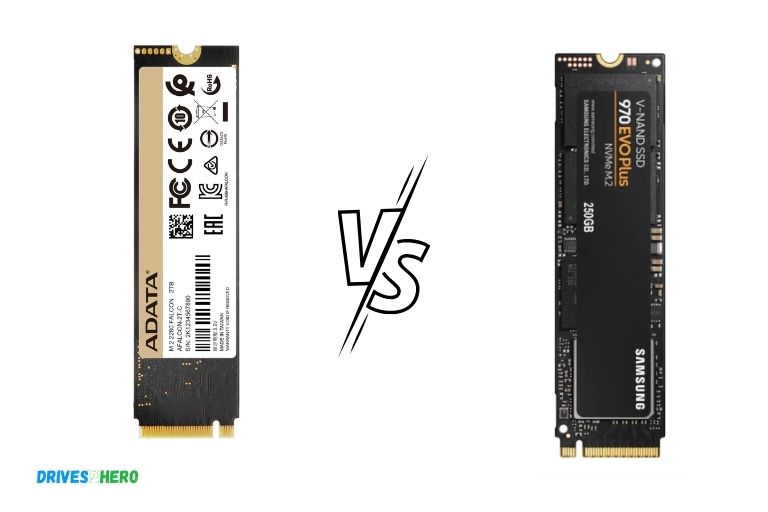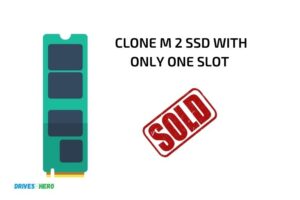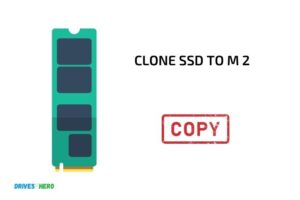Adata Vs Samsung M. 2 Ssd! Which One Better!
When comparing the ADATA and Samsung M.2 SSDs, Samsung often comes out on top due to its superior performance, reliability, and longevity.
Samsung’s SSDs are often favored by consumers for their consistently high speeds, advanced technology like V-NAND and NVMe, and excellent customer service.
Samsung and ADATA both manufacture M.2 SSDs, but they offer different features which make them suitable for different users.
Samsung’s SSDs, especially the 970 EVO and 970 PRO, are known for their high read and write speeds, making them ideal for high-performance tasks like gaming and professional work.
On the other hand, ADATA’s SSDs, such as the XPG SX8200 Pro, are more affordable and offer good performance, making them suitable for general use.
Samsung’s reputation for quality and performance is hard to match. They have a long history of producing reliable, high-speed SSDs.
The 970 EVO and 970 PRO, in particular, showcase their advanced technologies such as V-NAND and NVMe.
Alternatively, ADATA’s XPG SX8200 Pro is a good choice if you’re on a budget but still want decent performance. It may not match the speeds of Samsung’s top models, but it offers a good balance of price and performance.
7 Common Features Comparison of Adata and Samsung M.2 SSDs
| Features | ADATA M.2 SSD | Samsung M.2 SSD |
|---|---|---|
| Storage Capacity | 128GB – 2TB | 250GB – 2TB |
| Sequential Read Speed | Up to 3500MB/s | Up to 3500MB/s |
| Sequential Write Speed | Up to 3000MB/s | Up to 3300MB/s |
| Warranty | 5 years | 5 years |
| NAND Type | 3D NAND | V-NAND 3bit MLC |
| Interface | PCIe NVMe 3.0 x4 | PCIe NVMe 3.1 x4 |
| Form Factor | M.2 2280 | M.2 2280 |
| MTBF | 2,000,000 hours | 1,500,000 hours |
Key Takeaway

Five Facts About Adata and Samsung M.2 SSDs
Understanding The Difference Between Adata And Samsung M.2 Ssds
When it comes to purchasing a solid-state drive (ssd), the choice between adata and samsung m. 2 ssds can be challenging.
Both brands have their loyal fanbase due to their reliability, speed, and efficiency. However, there are some key differences that set them apart.
We will be comparing both brands to help you make an informed decision.
Comparison Of Adata And Samsung M.2 Ssds
Adata and samsung m. 2 ssds are two of the most popular brands in the market, and it’s helpful to understand their differences.
Here is a comparison of the two brands:
Price Point
- Adata m.2 ssds are generally less expensive than samsung m.2 ssds
- However, samsung m.2 ssds are often considered a better value due to their outstanding performance that justifies their cost.
Performance
- Samsung m.2 ssds typically outperform adata m. 2 ssds.
- Samsung m.2 ssds have higher read and write speeds, which means they can handle more tasks simultaneously and are ideal for professionals who need speed and reliability.
- Adata m.2 ssds are still fast and efficient, but they tend to be more suitable for general use than intensive workloads.
Compatibility
- Both ssds are compatible with most laptops, desktops, and motherboards that have an m.2 slot.
- Adata m.2 ssds, however, have compatibility issues with some motherboards, which means they may not run at optimal speeds.
Capacity
- Samsung m.2 ssds come in larger storage capacities, with some models offering up to 2tb of storage.
- Adata m.2 ssds also come in various sizes, but their offerings top off at 1tb.
Reliability
- Both adata and samsung m.2 ssds are reliable options with built-in features such as overheat protection and shock resistance to prevent damage caused by drops and shocks.
Looking at the above comparison, it’s safe to say that samsung m. 2 ssds are more expensive but boast better performance, compatibility, capacity, and reliability than adata m. 2 ssds.
However, if your budget for an ssd is tight, adata m. 2 ssds are a great option to consider. Ultimately, the choice between two of these brands depends on your specific needs.
Adata Vs Samsung M.2 Ssds: Performance
When choosing between adata and samsung m. 2 ssds, performance is undoubtedly a critical factor to consider.
Both brands have their strengths and weaknesses when it comes to read/write speeds and cache, so let’s dive into the details!
Sequential Read/Write Speeds
- Adata’s sequential read/write speeds for their ssds range from 500mb/s to 3500mb/s, depending on the model. On the other hand, samsung’s read/write speeds range from 2400mb/s to 7000mb/s.
- It’s worth noting that samsung’s high-end models tend to outperform adata’s models in terms of sequential read and write speeds. However, if you’re on a budget, adata still provides some decent options with reasonable speeds.
Random Read/Write Speeds
- In terms of random read/write speeds, adata’s ssds usually offer decent performance, with the higher-end models giving around 200k iops (input/output operations per second) for both random read and write.
- In comparison, samsung’s higher-end models provide over 400k iops, showcasing a clear performance advantage over adata.
- However, these high-end models are typically more expensive, so it’s essential to balance cost and performance when deciding on which one to choose.
Cache
- Both adata and samsung have ssds with varying levels of cache.
- Adata’s ssds generally have between 256mb to 1gb of cache, whereas samsung’s models have between 512mb to 2gb of cache.
- A larger cache will help improve an ssd’s performance, specifically when transferring data or copying files. Overall, it’s worth considering going for a higher storage capacity ssd to ensure a larger cache size.
Ultimately, when it comes to performance, samsung’s m. 2 ssds tend to have a performance advantage over adata’s models, particularly with high-end models.
However, adata provides a good range of options for budget-conscious consumers, and both brands have ample options depending on your needs.
Durability Comparison
Durability Comparison: Reliability
When it comes to durability, both adata and samsung m. 2 ssds have a reputation for being reliable. However, there are a few factors to consider when comparing the reliability of these two brands.
- Adata ssds are known for being reliable when it comes to handling power surges and voltage fluctuations. They have a built-in power-loss protection mechanism that helps protect data in the event of a sudden power failure. This makes them ideal for use in environments where power outages are common.
- Samsung ssds are also very reliable, with a low failure rate and a long lifespan. In fact, samsung is one of the most trusted brands in the ssd industry. They use high-quality components and have rigorous testing standards to ensure their ssds are up to the task of handling the most demanding workloads.
Both adata and samsung ssds come with a manufacturer’s warranty that covers any defects or failures that may occur.
However, the length and terms of these warranties vary between brands, which brings us to our next point.
Durability Comparison: Endurance
Endurance refers to how long an ssd can last under heavy workloads without experiencing performance degradation.
This is an important factor to consider if you plan on using your ssd for demanding workloads, such as video editing or gaming.
- Adata ssds have a lower endurance than samsung ssds, which means they may not be the best choice if you plan on using your ssd for heavy workloads. However, they are still a good choice for general use and offer a good balance of price and performance.
- Samsung ssds are known for their high endurance and are a great choice for users who need a reliable ssd that can handle heavy workloads. They use high-quality components and have a proven track record of being able to handle even the most demanding workloads.
Durability Comparison: Warranty
The warranty is an important factor to consider when choosing an ssd as it can provide peace of mind in case something goes wrong.
Here’s what you need to know about the warranties offered by adata and samsung:
- Adata ssds come with a three-year warranty that covers any defects or failures that may occur during that time. This is a standard warranty for most ssd brands and is sufficient for most users.
- Samsung ssds come with a five-year warranty, which is longer than most other brands. This warranty provides added peace of mind and ensures that your ssd will be covered for a longer period of time. Samsung also offers a data migration tool that makes it easy to transfer data from your old drive to your new samsung ssd.
Adata Vs Samsung M.2 Ssds: Price
When it comes to choosing between adata and samsung m. 2 ssds, the price is a significant consideration for most people.
In this section, we will compare the cost-effectiveness and budget considerations of both brands.
Cost-Effectiveness
- Adata m.2 ssds are generally more cost-effective than samsung m.2 ssds, making them a popular choice for people on a tight budget.
- However, it’s essential to keep in mind that adata drives are often slower and have lower endurance ratings than samsung ssds.
- Adata ssds generally come with shorter warranties when compared to samsung ssds.
Budget Considerations
- For budget-conscious shoppers who want a quality ssd, adata is an excellent choice.
- Adata’s drives like the xpg sx8200 pro are praised for their good performance, reliability, and value for money.
- Samsung ssds, on the other hand, are known for their high-end performance, making them a slightly more expensive option.
- However, samsung’s drives like the 970 evo plus offer features like faster speeds, higher endurance, longer warranties, and better customer support.
Adata and samsung m. 2 ssds both have their advantages and disadvantages when it comes to pricing.
While adata provides better value for money, samsung offers higher-end performance, longer warranties, and exceptional customer support. Ultimately, the choice comes down to budget and personal preference.
FAQ On Adata and Samsung M. 2 Ssd
What Is An M.2 Ssd?
An m. 2 ssd is a small, high-speed solid-state drive that fits directly into a motherboard slot.
What’s The Difference Between Adata And Samsung M.2 Ssds?
While both are reputable brands, samsung often offers better speeds and performance than adata.
Do I Need A Specific Type Of M.2 Ssd For My Computer?
Yes, you need to check your motherboard’s specifications to ensure compatibility with the specific type of m. 2 ssd.
How Do I Install An M.2 Ssd In My Computer?
Consult your motherboard’s manual to find the m. 2 slot, carefully insert the m. 2 ssd, and then secure it with a screw.
Conclusion
After extensive research and analysis, it is clear that both adata and samsung m. 2 ssds have unique features and advantages to offer.
While adata focuses on affordability and entry-level performance, samsung’s m. 2 ssds are a popular choice among enthusiasts and professionals who value speed and reliability.
Whether you’re a gamer, content creator, or a power user, the choice between the two depends on your specific needs and budget.
If you’re looking for maximum performance and unparalleled reliability, samsung’s m. 2 ssds are the way to go.
On the other hand, if you’re on a tight budget and still need decent storage performance, adata’s ssds are a great choice.
Ultimately, your choice between the two will depend on your needs and budget, so weigh the pros and cons carefully before making a decision.






